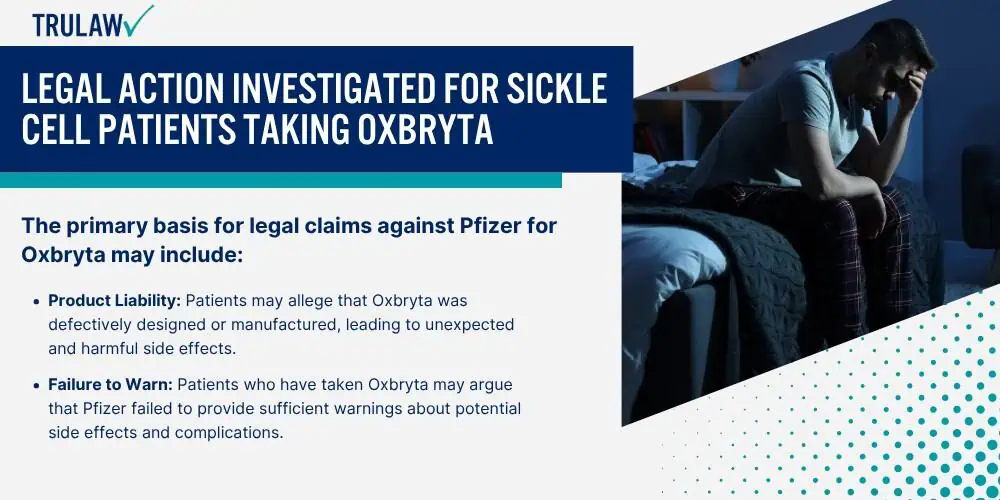The recent voluntary withdrawal of Oxbryta, a medication developed to treat sickle cell disease, has led to increasing legal investigations.
Patients who have taken Oxbryta and suffered complications or adverse effects may be eligible to pursue legal action against the drug’s manufacturer, Pfizer.
Lawsuits focusing on pharmaceutical drugs often focus on claims of product liability, inadequate warnings, or insufficient testing.

For Oxbryta users, these cases may assert that the manufacturer failed to fully disclose the risks associated with the drug or did not sufficiently warn healthcare providers and patients of potential adverse effects.
Understanding Oxbryta and its Potential Risks
Oxbryta (voxelotor) was designed to address complications of sickle cell disease by increasing hemoglobin levels and improving oxygen delivery throughout the body.
Approved by the FDA in 2019 for patients 12 and older, and later extended to younger children, the drug provided hope to many sickle cell patients who had limited treatment options.
Reports of complications, ranging from gastrointestinal issues to more severe reactions, have raised concerns about its safety and efficacy.
With the drug now voluntarily withdrawn from the market, many patients and families are questioning if adequate safety measures were in place and if Pfizer conducted thorough risk assessments before and after the drug’s release.
Basis for Legal Claims
The primary basis for legal claims against Pfizer for Oxbryta may include:
- Product Liability: Patients may allege that Oxbryta was defectively designed or manufactured, leading to unexpected and harmful side effects. Product liability laws hold manufacturers accountable if their drugs cause harm due to flaws in design or production.
- Failure to Warn: Patients who have taken Oxbryta may argue that Pfizer failed to provide sufficient warnings about potential side effects and complications. Drug manufacturers are legally required to inform consumers and healthcare providers about known risks associated with their medications, allowing patients to make informed decisions about their treatment.
- Negligence: Some claims may argue that Pfizer was negligent in the development, testing, or marketing of Oxbryta. If the company did not conduct thorough safety testing or ignored early signs of adverse effects, patients may be able to seek compensation for the harm they endured.
- Breach of Warranty: This claim may involve assertions that Pfizer guaranteed a certain level of safety or effectiveness that Oxbryta did not fulfill. Patients affected by side effects or complications may claim the drug did not perform as advertised.
Potential Compensation for Affected Patients
Patients who file lawsuits related to Oxbryta complications may seek compensation for various damages.
Damages can include:
- Medical Expenses: Reimbursement for medical treatments, hospitalization, and ongoing care related to complications from Oxbryta.
- Lost Wages: Compensation for time missed from work due to adverse health impacts and the necessary recovery time.
- Pain and Suffering: Financial redress for the physical and emotional distress caused by side effects.
- Loss of Quality of Life: Damages may be sought for the diminished quality of life resulting from severe or long-lasting complications.
- Punitive Damages: In cases where negligence or recklessness is demonstrated, punitive damages may be awarded to hold the manufacturer accountable and deter similar conduct.
Seeking Legal Assistance for Oxbryta-Related Claims
For individuals considering legal action, consulting with an experienced pharmaceutical injury attorney is essential.
Attorneys can provide guidance on the eligibility criteria, necessary documentation, and the potential value of each claim.
Given the complexity of pharmaceutical lawsuits, working with a legal team knowledgeable about drug recalls and product liability cases can improve the chances of achieving fair compensation.
Current Legal Landscape and Ongoing Investigations
The pharmaceutical industry is closely regulated, yet adverse reactions and safety issues with drugs remain a persistent concern.
Legal investigations are now focusing on whether Pfizer adequately informed the public and healthcare professionals about Oxbryta’s risks and whether patients suffered due to these potential oversights.
If you or a loved one have experienced complications from taking Oxbryta, legal action may provide a path to recovery.
Seeking a consultation with an attorney familiar with pharmaceutical injury claims can help you understand your rights and potential compensation options.




